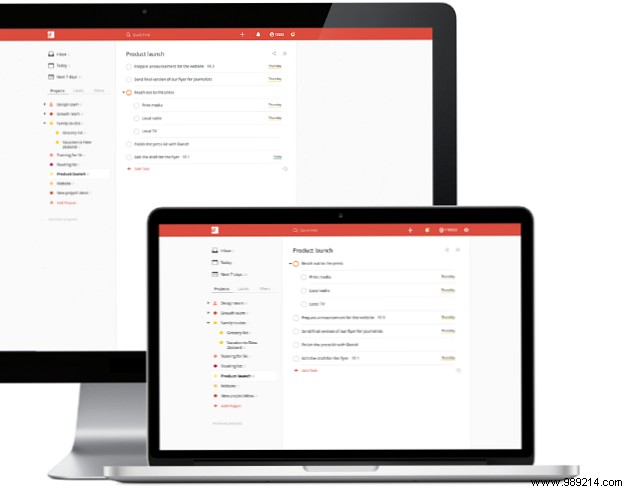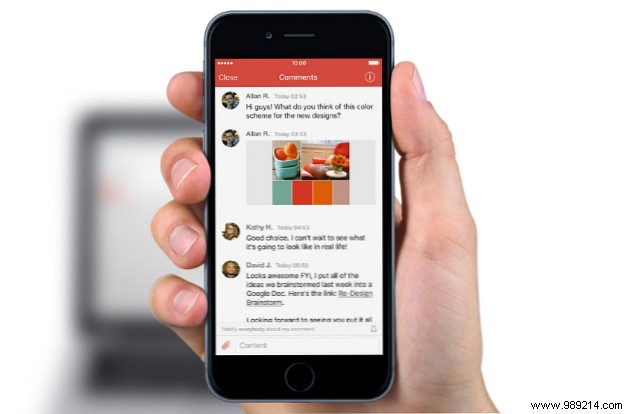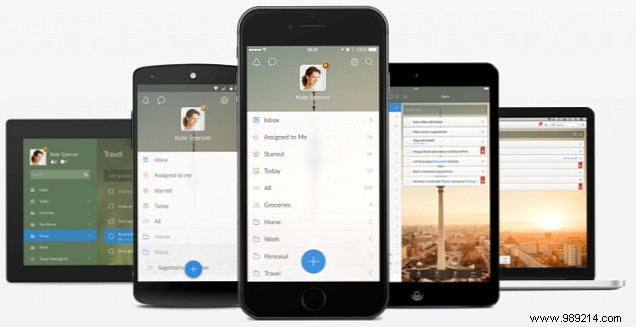When it comes to to-do list apps, there are a few that stand out above the rest. But how do they compare to each other?
Anyone who loves keeping digital lists organized The 3-Strike System:How to Prioritize Your To-Do List The 3-Strike System:How to Prioritize Your To-Do List Not getting your to-do list? The problem may not be your productivity, it may be your priorities. Let's learn how to prioritize to-do list and how to get things done. Read More Some people will want little more than an impressive user interface. Others will want IFTTT integrations. The Ultimate Guide to IFTTT:Use the Web's Most Powerful Tool Like a Pro. Make your apps and devices work together. Not sure how to build your applet? Follow along with this guide. Read More
The few apps below should cover all the bases and satisfy most of the commandments for choosing the right to-do list app The 5 Commandments for Choosing the Right To-Do App for Productivity The 5 Commandments for Choosing the Right To-Do App for productivity Different people organize themselves in different ways. So choosing a to-do app really depends on what kind of person you are. Here are five commandments you can think of for your own productivity system. Read more . Each of these is available at a minimum on Android, iOS, and as a web app. They all have a great design. And each has its own set of powerful features. Let's see how they compare.
Any.do was the first to-do list app that I have relied heavily on. Initially, it was the app's clean and minimalistic user interface that won me over. But it was its extra features that kept me hooked for over two years.

This app is available on iOS, Android, Web, Mac..
Once you've signed in to Any.do, you can create different lists to help separate your tasks (work, personal, shopping, etc.). For each task within these lists, you can include subtasks, notes, due dates, priority status, attachments (limited to 1.5 MB per file), and some very basic features for recurring tasks. If you install the Any.do Chrome extension, you can also add tasks from Gmail.
When you open each list, you can view and sort these tasks in different ways. Time view allows you to see the tasks you need to complete today, tomorrow, next, or someday. There is also a Standard List View , and a Priority List View . If you turn the phone sideways, you can access a Calendar view . It's these views that really set Any.do apart from more basic apps like Apple Reminders.

The main differentiator for Any.do, however, is its Moments characteristic. When you turn on Moments (I'd recommend doing it once a day or once a week), you'll quickly be asked questions about some of your tasks. These types of games sort your to-do list, keep it constantly in order, and create a list of tasks that you need to complete today and tomorrow. In the free version, you can use this feature 5 times per month.
When you upgrade to the premium version of Any.do for $3 per month, all restrictions to the free version are removed.
You can share as many lists and tasks as you like with other people (turning Any.do into a project management app). You can fully customize recurring tasks, to appear every 2 weeks, every 4 months, etc. File upload limits are increased to 100 MB. And you can use Moments as many times as you want.
Plus, you can add location-based tasks and get a reminder when your GPS detects you're near a certain location.
Any.do is a great app to use, but it has some drawbacks that forced me to start using something else.
When I reluctantly abandoned Any.do, Todoist is the app I started using instead. This is a slightly more feature-rich option, available on iOS, Android, Mac, Windows, and the web.

While it (possibly) doesn't look as pretty as Any.do, it's definitely a heavy duty to-do list app.
The basic operation of Todoist is relatively similar to Any.do. You can create different task lists (Projects ). Within each list, you can add individual tasks and then drag and drop these tasks to order them. Each task can be scheduled today , tomorrow , next month , or for a specific date). And if you want to reschedule a task from the mobile app, just swipe left.
Each task can be assigned one of four priority settings (where Any.do only offers one). You also have full access to recurring event features and can add subtasks within each individual task. You can even share each project with up to 5 people, although file uploads are not allowed.

What really sold Todoist for me, however, is its incredible ability to interpret natural language. This makes scheduling one-time and recurring events a breeze. And it's easy to integrate with IFTTT and Zapier, making it easy to add tasks automatically. For example, IFTTT can add a task to Todoist if you miss a call. Or if you are assigned a task in Trello. Or if an event is added to Google Calendar. There are many more integration options Automate your life and work with Todoist and IFTTT Automate your life and work with Todoist and IFTTT Play creatively with ToDoist's notification features, and IFTTT's ability to do some really cool automation with them. We show you how to combine the two powers your productivity. Read more.
All of this really helps manage your schedule much more effectively.
If you decide to pay $30 per year for the premium version of Todoist, you will receive a number of additional features.
You can add reminders to each of your tasks, as well as tag them for better classification. You can send tasks to your Todoist account via email. You can sync your tasks with iCal. You can add tasks based on location.
In addition to this, you'll have access to some interesting charts and graphs to visualize your productivity and review completed tasks (this is particularly useful if you're following GTD Organize 2015:Learn the Martial Art of Getting Things Done [Things to Watch] Organize 2015:Learn the martial art of getting things done [Things to watch] Have you ever wondered why achievers and achievers always seem to keep a cool head?Read More).
As you can see, Todoist squeezes a bit more into its offering than Any.do, but that doesn't make it perfect. It's almost there. But not quite. I have noticed two small problems:
Available on iOS, Android, Apple Watch, Windows, Mac, and the web, Wunderlist is a ubiquitous task management app used by millions.

As with Any.do and Todoist, Wunderlist has its advantages, but it also has a couple of drawbacks.
The free version of Wunderlist is probably the most generous of the three apps seen in this article. You essentially have access to everyone Features, but with a couple of restrictions.
As with the other two apps, you can create lists (which can be shared with other users) and easily organize your tasks within these lists. If you have a lot of lists, you can organize them into folders. How to use the new Wunderlist folders to enhance your to-do list. How to use the new Wunderlist folders to grow your to-do list. Wunderlist has a big update with two essential new features. for a good task app:organize and add tasks quickly. Does this help make it your productivity app of choice? Read More
For each task, you can set a due date (in natural language), including some basic recurring options. These recurring options are better than Any.do's free recurring options, but they're not as impressive as Todoist's. You can also set reminders (which you can't do in the free Todoist package), and events can be starred to mark them as high priority.

If you want to use Todoist as a project management app, you can add up to 25 subtasks to each individual task. Notes, comments and files can also be added. When a list has been shared with another user, up to 25 tasks can be assigned to help you delegate that work.
As with Todoist, tasks can also be added automatically using Zapier's integrations. For example, starred emails can be sent to your to-do list, and Google tasks can be synced with Wunderlist.
When it comes to reviewing your tasks, they can be sorted alphabetically, by due date, by date created, or by priority. If a task is due today or this week, you can also view them as separate lists. For even more control, you can add hashtags to each of your tasks, then use the in-app search bar to filter your tasks by these hashtags.
For $5 a month, you can unlock the premium version of Wunderlist. Instead of uncovering features for you, the premium version simply removes some restrictions.
In essence, the 5MB file upload limit will be removed, you will be able to assign unlimited tasks and add unlimited child tasks to your lists.
Each of these to-do list apps can do their jobs extremely well, but which is “better” all depends on what you need The best productivity tool is the one you actually use The best productivity tool is the one you actually use In a productivity-seeking world, every shiny new productivity app promises something new. But are we missing something when we change our productivity apps too often? Read more . For example, if you're already using OneNote for your notes 5 Tips for Using OneNote as Your To-Do List 5 Tips for Using OneNote as Your To-Do List Are you creating a to-do list on your to-do list? Set it up in OneNote to make things as easy as possible. Learn more and Outlook for your tasks How to use Outlook for simple tasks and project management How to use Outlook for simple tasks and project management Outlook can function as a simple tool for managing projects and tasks. Here's how to set up Outlook Tasks to set reminders and due dates, assign to-dos, and track links. Read More
However, if you're looking for a new app and want something pretty basic, that looks amazing and is easy to use, the free version of Any.do should be perfect. If you want something with more features, plus integration with other apps (via Zapier), but don't want to pay, I recommend the free version of Wunderlist.
If you want the full set of features, IFTTT and Zapier integration and an amazing user interface, splash and buy the premium version of Todoist. This is the option I chose after trying the other two apps for a long period of time, and so far, I don't regret anything.
You:which to-do list app do you think will fit your requirements? Or are there others that you think are even better than these??